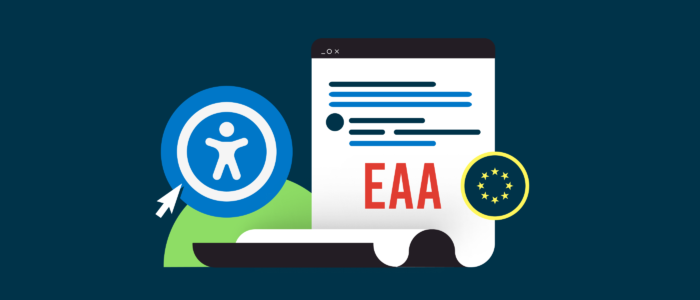An introduction to the European Accessibility Act (EAA)
The European Accessibility Act (EAA) is a crucial piece of legislation becoming national law in all 27 EU member states, taking effect on June 28th, 2025. This act will significantly impact industries operating in or selling within the EU, requiring them to ensure accessibility in their products and services, including e-commerce and banking. The EAA aims to coordinate accessibility standards across member states, simplify cross-border trade, and increase accessibility to a wider range of services.
What is the EAA?
The European Accessibility Act (EAA) is a directive (2019/882) of the European Union aimed at improving the accessibility of products and services for people with disabilities and the elderly across the EU. The EAA reflects the commitment to accessibility made by the EU and all Member States as part of ratifying the United Nations Convention on the Rights of Persons with Disabilities.
The EAA was officially adopted in April 2019 to remove barriers created by the disconnected rules and standards across EU member states, facilitating easier cross-border trade and ensuring accessible products and services are more affordable and widely available. It provides a framework with minimum requirements that each member state must uphold.
The directive’s implementation is specific to each country and, as a result, each country’s accessibility regulation varies to some degree.
What’s covered under the EAA?
The influence of the European Accessibility Act affects a broad assortment of products and services. Its provisions are foundational to creating a more inclusive and balanced marketplace.
The EAA covers a wide range of products and services, including personal devices like computers and smartphones, public services such as ATMs and kiosks, ticketing machines, public transport services, banking services and e-commerce websites. The directive also applies to enterprises outside of the EU providing services or selling products to consumers within the EU, such as a US-owned retail website aimed at consumers in the EU or within a specific country of the EU, or smartphone or eReader devices sold in the EU by a US-based company.
When does the EAA go into effect?
The EAA requires EU member states to adopt and publish all necessary laws, regulations, and administrative provisions to comply with the directive by June 28, 2025.
By June 28, 2025, the requirements of the EAA must be fully implemented and newly marketed products and services within the scope of the EAA are to be launched as conformant.
Note: not all EU member countries have complied with this directive (e.g. Ireland published their regulation in January 2024 and Belgium has only partially transposed the EAA). The EU has sanctioned all countries that are not compliant with the directive.
How do I ensure EAA compliance?
Navigating the EAA can seem daunting, however, understanding the following ways to ensure EAA compliance will empower organizations to foster an accessible environment, ultimately making the EU a more inclusive and equitable society.
Regular compliance checks
National authorities will be responsible for carrying out regular compliance checks, which will include reviewing complaints and following up on any reported non-compliance. Businesses will be required to take corrective action if their products or services are found to be non-compliant, which could involve making changes to their products or services or implementing new training programs.
Accessibility compliance and evidence for service providers
Service providers will need to explain in the terms and conditions, or a similar official document, how a service meets the digital accessibility requirements. Where applicable, the information must contain:
- A broad overview of what the service is, in a manner that everyone can understand, regardless of their accessibility needs
- Detailed guidelines and explanations on using the service
- An explanation of how the service aligns with the digital accessibility standards listed in Annex I of the European Accessibility Act
Service providers will also need to share evidence that the way the service is delivered and monitored complies with the above and all other applicable requirements of the EAA. This information must be made available to the public in an accessible format.
What happens if my product or service is not accessible?
Regulatory implications for non-compliance with the EAA include potential fines and other penalties, although the specific nature and amount of these fines are left to the discretion of individual member states. The directive does mandate that penalties must be “effective, proportionate, and dissuasive” and consumers can report infringements to a court or the enforcing body in their country.
While the penalties for non-compliance with the EAA are not specified in detail, the act emphasizes establishing a regulatory framework that encourages companies to prioritize accessibility. This framework promotes accessible products and services as the norm to avoid legal and financial consequences.
Different EU member states have different rules for accessibility fines and penalties. Some member states have defined monetary fines for companies and individuals, and others have even set guidelines for imprisonment for certain corporate positions. However, some member states have not yet defined any fines or penalties.
Take action on EAA today
The European Accessibility Act (EAA) is a ground-breaking piece of legislation across the European Union geared towards enhancing the accessibility of services and products for elderly individuals and people with disabilities to ensure a more inclusive market.
If you’re an EU-based organization or do business within the EU, Deque can help ensure you meet EAA requirements:
